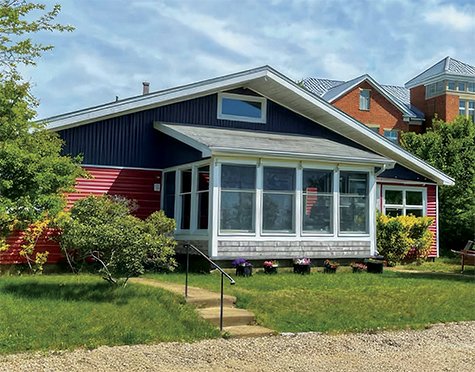ON ISLAND

Red House - An Island Pathway to Recovery
Providing Support to the Vineyard Community Affected by Addiction
By Tessa Permar
Seeking help for substance use disorder in a small community is no small feat. For those who are struggling with a substance or behavioral addiction, for friends, family, and community members, and for those looking to help, Red House’s doors are open.
A Martha’s Vineyard Community Services (MVCS) organization, Red House is a state funded Peer Recovery Support Center located on Beach Road next to the Martha’s Vineyard Hospital. Their mission is to provide peer-to-peer recovery support services to members of the Vineyard community affected by addiction. “People often think they have to have solid recovery [to come to Red House], but we want everybody: people with a question or concern, if it’s a family member…We’re open and we welcome anyone who would like to come in and say hi,” says Robert Cropper, Director of Recovery Management Services at MVCS and Interim Director of Red House.
Newcomers to Red House can find a space to speak openly about their experience with addiction with peers and counselors who are also in recovery, learn about a range of supports and recovery approaches, and explore sober activities like yoga and cooking. Robert Cropper explains the origins of centers like Red House: “The state of Massachusetts has been amazing in their reach and their desire to really bring substance use disorder to the table, to reduce stigma, and to give it the priority that it needs. One thing that they realized is that, especially for alcoholism and drug addiction, that NA (Narcotics Anonymous) and AA (Alcoholics Anonymous) were very helpful, but they just weren't for everyone. So they wanted to create spaces that honored any form of recovery. Anything that got us to a place of considering giving up our addiction is valid.”
Robert emphasizes, “There are many tools that work, and we concentrate on tools that are in addition to AA but not to replace it. Someone can have a therapist, a sponsor, a coach, go to 12 Step meetings, come to Red House and they have a good chance of succeeding.”
Red House was founded around the goals of reducing stigma, of meeting people where they are at, and of offering a number of different recovery practices. They provide recovery paths that emphasize spirituality like Recovery Dharma, an approach based on Buddhist principles, and Overcomers Outreach, which centers Christian beliefs. They also support a range of mind and body practices like meditation, yoga, and calisthenics. They host regular opportunities to cook and eat among peers. And they offer meetings dedicated to groups within the recovery community including women, Portuguese-speakers, and seniors. We encourage and support all paths of recovery from both behavioral and substance addiction in a safe and inclusive environment, reads their website.
In addition to their director, Red House’s staff includes Program Coordinator David Ferguson, Community Engagement Coordinator Shivi Datta, and Volunteer Coordinator John Tau. David Ferguson explains that one of the barriers to seeking help especially in a small community is “a perceived shame and potential for outing yourself on a small island… it’s a real hindrance. But the best thing you can do is ask for help.” By sharing and owning his story, David puts a personal and empathetic face to an experience that, while incredibly common, still receives a lot of stigma. “I always find comfort in other people’s stories,” shares David. The power of having an agency staffed by people also in recovery, Robert echoes, is that “it really opens the door for people to see: I can admit that I’m an alcoholic, and have a job, have friends, and it doesn’t have to be in the shadows.”
Another superpower of the Red House staff is their ability to connect visitors with other resources like therapy, housing support, or employment help. As an MV Community Services Organization, Red House can make referrals and expedite the process of accessing services. “Shivi Datta and John Tau are both working recovery coaches so anyone who walks in and needs services, they’re on it,” says Robert. Peer to peer connection is key in recovery and at Red House. In addition to recovery coaches, Red House is a space for peer leaders, people in the recovery community who aren’t on staff but who can be a first connection with someone new walking in the door. “It’s peer led and peer driven place,” explains David. “The goal is to have a dedicated group of people who volunteer regularly.”
Volunteer opportunities at Red House are numerous and varied depending on someone’s availability and interests. Community members can welcome newcomers as a greeter, support administrative tasks, plan events, or teach a class. Volunteers help sustain Red House’s Recovery Cafe program, a free meal offered Mondays, Wednesdays, and Fridays, by cooking one meal a week. Red House seeks to empower its community members to take leadership roles in whatever way they can. Peer leaders, recovery coaches, volunteers, newcomers, regulars, and staff are all key to growing and sustaining a recovery center that can meet the needs of the Vineyard Community.
“One thing that happens with people, especially those who are struggling to stay sober,” Robert Cropper reflects, “is that they become very self-critical. We use the term recovery rather than sobriety because we recognize that slipping is part of the recovery.” He encourages people to “not beat themselves up, and to just put one foot in front of the other. Come back, reconnect, have lunch and talk.” Red House Peer Recovery Center is open Monday through Friday 9am to 6pm and Saturdays 10am - 4pm. Wherever you are in your recovery process, Red House’s doors are open.
For more information click: redhouserecovery.org. If you have an urgent mental health concern, please contact: Martha’s Vineyard Community Services, 8am-8pm, Mon- Fri at 508-693-7900, option 4. MVCS provides assessment, treatment, support, case management, and referral for Islanders with urgent needs related to mental health and/or substance misuse.








